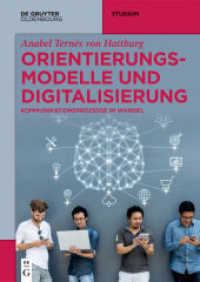- ホーム
- > 洋書
- > 英文書
- > History / World
Full Description
For undergraduate or graduate courses in World History
This impressive collection of readings illustrates that the history of the world is as much about the relationships among societies as it is about transformations and continuities within societies.
Exchanges: A Global History Reader is designed as an introduction to the discipline of world history. Unlike other source collections, Exchanges helps students look beyond strictly delineated regionalism and chronological structures to understand history as a product of ongoing debate. Structured around a series of interconnected themes and debates, and pairing both primary and secondary sources, Exchanges challenges both students and teachers to rethink history.
Praise for Exchanges: A Global History Reader
The authors have successfully produced a text that will allow students to explore the ways in which historical writing has
generated important debates about world history.... It offers a rich and diverse compilation of reading materials that provide
students with ideas about world history, but also with models of historical writing.... Moreover, it offers examples from a wide
range of geographical areas, something that will help broaden the horizons of the average student.
——Esperanza Brizuela-Garcia, Montclair State University
The method of placing competing narratives side by side is one of the best strategies for demonstrating the nature of history as
an interpretation.... I am very excited about the possibilities that this text could provide for transforming my World Civilizations
course. An attentive student will find his or her basic assumptions challenged on every page, and it is this kind of intellectual
transformation that I seek to facilitate as a teacher.
——Carolyn R. Dupont, Eastern Kentucky University
I think this textbook goes a long way toward helping students to think more deeply and more historically about the state of the
world today.... The fact that the book is focused upon the five big questions of world history is a great plus. Too many world
history readers have a diffuse focus and don't really add up to a book that promotes sustained, focused inquiry.
——Mark Jones, Central Connecticut State University
I would describe the book as an introduction to being a world historian. Through a selection of thematic case studies,
students are able to compare theories, test historians' interpretations against the primary evidence, and access the range
of material that allows them to develop their own interpretations of the worlds they inhabit and inherit.
——Lesley Mary Smith, George Mason University
Exchanges focuses more than any other reader on the interconnectedness of regions and the debates pertaining to the new
world history.... The authors successfully demonstrate that history is contested to this day. Not only is this a more accurate
portrayal of historical scholarship than most readers provide, it is also more interesting for the students, who are more likely
to appreciate history if they see it as contested, often for reasons closely connected with the state of the world today.
——A. Martin Wainwright, University of Akron
Contents
Introduction
1
What Is World History?: An Introduction for Students of
the Premodern World 1
Questions and Connections: The World before c. 1500 C.E. 2
Geography and Periodization 2
Sources 5
Themes in Premodern World History 7
Civilization: A Student's Introduction 10
The Evolution of the Term Civilization 11
>> 1. FERDNAND BRAUDEL , A History of Civilizations 11
The "Clash of Civilizations" 12
>> 2. SAMUEL P. HUNTINGTON , "The Clash of Civilizations?" 13
An Afrocentric Critique of Civilization 13
>> 3. CHEIKH ANTA DIOP , The African Origin of Civilization:
Myth or Reality 13
A Transnational Critique of Civilization Theory 16
>> 4. ANDRE GUNDER FRANK , Toward Humano- and Eco-centrism:
Unity in Diversity, Not Clash in Civilizations 17
Part 1
Interrogating the Origins and Development
of Civilization and City-State Societies
(c. 8000—600 B.C.E.) 19
Chapter 1 The Natural Environment and Human
Beings: Constraints and Advantages 24
The Importance of Geography in History 26
>> 5. FERNAND BRAUDEL , A History of Civilizations 26
The Physical Environment of Early Mesopotamia 27
>> 6. J. N. POSTGATE , Early Mesopotamia: Society and Economy
at the Dawn of History 28
Gilgamesh and the Great Flood 29
>> 7. The Epic of Gilgamesh, translated by N. K. Sandars 30
Hymn to Hapy 31
>> 8. Hymn to Hapy 32
iii
The Physical Environment of Mesoamerica 34
>> 9. Popol Vuh, translated by Dennis Tedlock 35
Chapter 2 The Origins of Agriculture and Civilization 38
The First Farmers 40
>> 10. JARED DIAMOND , Location, Location, Location:
The First Farmers 41
The Eloquent Peasant 43
>> 11. The Eloquent Peasant 44
Agriculture 45
>> 12. FRANCESCA BRAY , Agriculture 45
Complex Food Systems in Mesoamerica 47
>> 13. JOHN S. HENDERSON , The World of the Ancient Maya 47
Complex Food Systems in Africa 49
>> 14. DAVID L. SCHOENBRUN , We Are What We Eat: Ancient Agriculture
between the Great Lakes 50
Conversations with Ogotemêlli 52
>> 15. MARCEL GRIAULE , Conversations with Ogotemmêli:
An Introduction to Dogon Religious Ideas 52
Cultural Heroes and the Origins of Agriculture 53
>> 16. Han Shu 24, translated by Nancy Lee Swann 54
Chapter 3 The City: Its Origins and Nature 56
Early Mesopotamian Cities 58
>> 17. J. N. POSTGATE , Early Mesopotamia: Society and Economy
at the Dawn of History 59
Uruk, a Mesopotamian City 60
>> 18. The Epic of Gilgamesh, translated by N. K. Sandars 61
Cities in Mesoamerica 62
>> 19. OCTAVIO PAZ , Food of the Gods 63
>> 20. RICHARD M. LEVENTHAL AND CHARLES H. HOWARTH, JR., "Copan:
Ancient City of the Maya" 64
The Origins of the Polis 66
>> 21. ANTHONY SNODGRASS , Archaic Greece: The Age of Experiment 66
The Polis of Athens 68
>> 22. THUCYDIDES , History of the Peloponnesian War, translated








